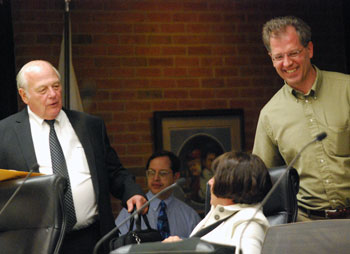Council Votes on Liquor, Delays on Marijuana
Ann Arbor city council meeting (March 19, 2012): With only eight out of 11 city councilmembers in attendance, the council found some of its business a challenge to complete.

From left: Ann Arbor city councilmembers Tony Derezinski (Ward 2), Jane Lumm (Ward 2) and Stephen Kunselman (Ward 3) as they arrive to the March 19 meeting. Lumm was clearly feeling ill and was encouraged by her colleagues to head home, advice she heeded. (Photos by the writer.)
The council postponed for a second time (without deliberation) a resolution that would direct Ann Arbor’s city attorney to delay enforcement activities against medical marijuana dispensaries, except in limited circumstances. The only reason offered for postponing was to allow the absent councilmembers to participate in that vote. The same resolution had been postponed previously, at the council’s March 5 meeting. On that occasion, other deliberations had pushed the council’s meeting past midnight, and councilmembers had wanted to deal with the issue while they were fully awake.
And the council found itself unable to muster a six-vote majority for any intermediate action on a proposed change to the landscape and screening ordinance – and thus wound up simply defeating it. The changes would have restricted additional landscaping requirements just to those site plans requiring planning commission or city council approval, and would have exempted R4C (multi-family residential) districts from certain buffering requirements. Attempts to amend, postpone and table the resolution all failed on 5-3 votes, one vote short of the majority needed.
Several agenda items highlighted the Ann Arbor police department in some fashion. The council authorized the purchase of four new police vehicles, along with a street sweeper. And a new contract with the command officers union was one of two labor contracts ratified by the council at its meeting – the other was with the firefighters union. Deputy chief John Seto, who’ll be interim police chief when Barnett Jones retires at the end of the month, briefed the council on police activity on St. Patrick’s Day as well as during a severe storm the week before. Seto also was criticized during public commentary for a traffic stop he’s alleged to have made as a patrol officer in the mid-1990s.
The police department was also a key actor in the city council’s action to recommend to the Michigan Liquor Control Commission that the liquor license not be renewed for Dream Nite Club, located on Fourth Avenue in downtown Ann Arbor. At an administrative hearing earlier in the day on that issue, much of the evidence presented by the city was based on police reports or police officer testimony.
In other business, the council approved an upgrade to control room equipment for Community Television Network. The city also added a total of around 160 acres to its greenbelt program, while selling a tiny wedge of property on Summit Street that had a murky history. Also related to land and its use, the city gave final approval to a rezoning request for the Les Voyageurs Society property located near Argo Dam.
The council passed a resolution expressing opposition to pending state legislation, which has already won approval from the Michigan house of representatives, that would allow grass clippings to be dumped in landfills under certain conditions.
The topic of Fuller Road Station emerged during public commentary as well as during remarks at the council table.
And councilmember Stephen Kunselman (Ward 3) alerted his council colleagues that he’d be pressing two issues in the near future: (1) getting a written, public legal opinion from the city attorney regarding the city’s Percent for Art program; and (2) getting a calculation by the city treasurer of the tax capture to which the Ann Arbor Downtown Development Authority is entitled. [Full Story]



